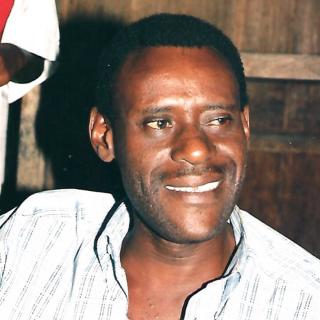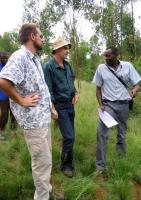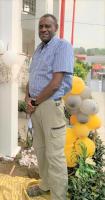Diomède Nzobambona was born on 1 January 1959 in the village of Mugano, central Burundi. He went to primary school in Mugano from 1963 to 1969 and attended secondary school at the Collège Notre Dame in the city of Gitega (1969–1976). He then moved to Algeria to study geological engineering at the Faculty of Hydrocarbons and Chemistry, University of Boumerdès, from 1976 to 1981. After finishing his degree, he returned to Burundi and joined a German mining exploration company, based in the capital Bujumbura. In 1988 he took up a new position as an adviser in the Burundian government’s Department of Rural Development, with responsibility for rural housing and roads. Diomède remained there until 1994 when he joined the Belgian Development Agency’s team in Burundi, where he spent five years running a rural housing project that used locally sourced construction materials. After that he became technical manager at the Bujumbura-based construction company Bataco.
In August 2003 the ICRC delegation in Bujumbura hired Diomède as a water and habitat (WatHab) engineer. The country was then still in the grip of a long-running civil war (1993–2005) that had claimed hundreds of thousands of lives. Diomède brought many skills, and he was among the first geographical information system (GIS) officers at the ICRC. In 2006, however, he had to flee Burundi, fearing persecution, and moved to Canada, where he joined the Canadian Red Cross. His wife and three young children moved to Canada in 2008. Over the next few years, Diomède was seconded to the ICRC as a water engineer for several assignments. He was in Abéché, Chad (May 2007 to December 2008); Najaf, Iraq (January to November 2009); Man, Côte d’Ivoire (November 2009 to June 2011); Gao and Mopti, Mali (December 2011 to December 2012).
Wherever Diomède went, he left a lasting impression as someone who was kind, considerate and conscientious. He became a friend and mentor to many. Also, it was difficult to miss him: a gentle giant of man, Diomède stood head and shoulders above most people. He loved walking – and with his long stride, he would cover many kilometres in his spare time. He was also full of stories, generous with advice, and always ready to share his broad knowledge built up over many years. Plus, he kept his cool in a crisis. In 2012, when the city of Gao fell into the hands of armed groups, a dozen ICRC staff spent 48 hours lying low before evacuating to Niger. Among them was Diomède, who was calmness personified and helped to negotiate the team’s exit.
In 2013 Diomède became an ICRC expatriate employee and spent the next few years on assignment all over the world, from South Sudan to Mauritania and Iraq to Yemen. In Mauritania, he was based for over two years in the capital Nouakchott (April 2013 to August 2015). His time there gave him a deep understanding of the country, the challenges people faced and how to get things done. Because getting things done – whatever the circumstances – was paramount to Diomède. He had a determined and curious mind, and was always on the lookout for innovations, training courses and new ways of working. He completed a master’s degree in civil engineering from Loughborough University, UK (2012–2015).
The next stop was Juba, South Sudan, where in September 2015 Diomède became WatHab’s first urban water delegate. He embraced his new role with the same vigour and commitment as before. He was an excellent site manager, both demanding in terms of quality and focused on building a strong team and a productive partnership with the local water authority.
Diomède then switched to Nigeria in September 2017, first in Port Harcourt and later in Maiduguri. In Port Harcourt, he headed a WatHab team working on a community-based project in a shanty settlement. Not for the first time, his engineering experience proved invaluable. The same could be said of his leadership skills during what was a challenging assignment in Maiduguri.
His next posting was to Sana’a, Yemen, from September to December 2019. Because of difficulties in obtaining a visa, Diomède had to manage the Sana’a WatHab team remotely from Djibouti. Despite the distance, he was able to provide effective support and guidance. After Yemen came Cameroon, starting in January 2020. Diomède was responsible for all WatHab activities in the Bamenda subdelegation (in the north-west of the country), where he was based, and in the Buea subdelegation (south-west). Both were newly established, and Diomède had to hire, coach and supervise two WatHab teams and all their work. Once again his experience and knowledge, built up over two decades with the ICRC, were priceless. Colleagues were more than delighted when he extended his assignment for another year.
On Sunday, 22 August, Diomède was out for a walk in Bamenda, as he did every weekend, when he was attacked by armed men in the middle of the afternoon. He died from his injuries the next day. He was 62.
Diomède’s humanity and friendship left a deep and lasting impression on many people. Today, ICRC staff worldwide continue to benefit from his wisdom and rich life experience: Diomède was a member of the team behind the Values Compass project, an ICRC-wide consultation aimed at defining a new set of internal values for the organization. His legacy lives on through this project.


